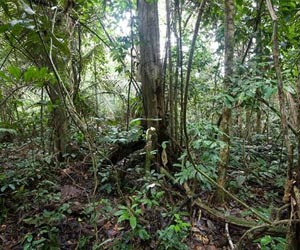| . |  |
. |
Paris (AFP) July 15, 2010 Illegal logging of tropical woodland has fallen sharply, providing welcome news in the fight against climate change and a lifeline for a billion poor people who depend on forests for survival, a report released Thursday said. Since 2000, international efforts to stem the illicit felling of trees has spared some 17 million hectares (42 million acres) in three countries alone, amounting to a preserved area larger than England and Wales, the London think tank Chatham House said. In Brazil, which contains more than a quarter of the planet's tropical cover, outlaw logging over the last decade dropped by between 50 and 75 percent, mainly due to stricter laws and tougher enforcement. The rate of decline in Indonesia was 75 percent, and in Cameroon pirate logging was cut in half. But in two other countries covered by the study, the level remained roughly unchanged over the same period. In Ghana, the problem continues to be endemic, accounting for around two-thirds of overall timber production. And in Malaysia, illegal harvesting still represents 14 to 25 percent of total output, the lowest of the five nations under review. Overall, illegal logging remains a serious challenge. In 2009, a total of 100 million cubic metres were illegally harvested in these countries alone. The stakes are high, said lead author Sam Lawson. "Up to a billion of the world's poorest people are dependent on forests, and reductions in illegal logging are helping to protect their livelihoods," he said. The findings also highlight the critical role of forests as a bulkhead against global warming: deviation from 'business as usual' has kept at least 1.2 billion tonnes of heat-trapping CO2 from leaking in the atmosphere, he said. Further efforts on forest preservation are being pursued under the UN Framework Convention on Climate Change (UNFCCC). Loss of forestry accounts for between 12 and 20 percent of annual greenhouse-gas emissions. But illegal logging remains a relatively small part of the problem -- conversion of forest land to crops, cattle ranching and urban construction are bigger factors. Globally, about 130,000 square kilometres (50,000 square miles) of mainly tropical forests were lost every year over the last decade, according to the Food and Agriculture Organisation (FAO). The Chatham House study estimates that five consumer nations -- the United States, Japan, Britain, France and the Netherlands -- together purchased 17 million cubic metres of illegal timber in 2008 worth about 8.4 billion dollars (6.7 billion euros). Most of the wood entered these countries in the form of furniture and plywood, mainly from China, which has become the largest importer, processor and exporter of illegal timber in the world, according to the study. Recent legislation in Washington and Brussels may help to curb traffic in illicit tropic woods even further. In 2008, the United States became the first country to prohibit all trade in plants and plant products -- furniture, paper, lumber -- sourced illegally. The Lacey Act requires importers to indicate exact origin of wood products, and provides for stiff penalties. The European Parliament this month approved similar legislation, widely hailed by environmental groups as a critical step in the protection of tropical forests. In parallel, a group of wealthy nations led by France and Norway have pledged 3.5 billion dollars from 2010 to 2012 to provide financial incentives for poor tropical countries to preserve their forests rather than chop them down for timber or to make way for farms.
Share This Article With Planet Earth
Related Links Forestry News - Global and Local News, Science and Application
 Storm may have killed half a billion trees
Storm may have killed half a billion treesWashington (UPI) Jul 12, 2010 A violent storm that swept through Brazil's Amazon rain forest in 2005 may have killed half a billion trees in just two days, a new study says. Storms have been understood as one cause of Amazon tree loss, but a new study funded by NASA and Tulane University says the losses are much greater than previously suspected, a release by the American Geophysical Union said Monday. A peak ... read more |
|
| The content herein, unless otherwise known to be public domain, are Copyright 1995-2010 - SpaceDaily. AFP and UPI Wire Stories are copyright Agence France-Presse and United Press International. ESA Portal Reports are copyright European Space Agency. All NASA sourced material is public domain. Additional copyrights may apply in whole or part to other bona fide parties. Advertising does not imply endorsement,agreement or approval of any opinions, statements or information provided by SpaceDaily on any Web page published or hosted by SpaceDaily. Privacy Statement |